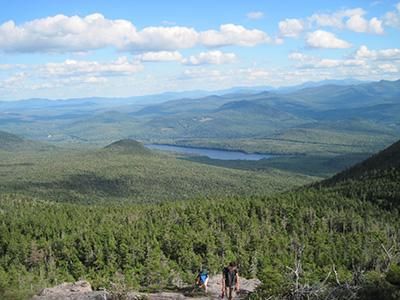
Hiking up North Percy Peak in Stark, which overlooks the Forest Society's Kauffmann Forest, does wonders for brain overload. Forest Society photo.
Do you ever suffer from TMOYMS -- Too Much On Your Mind Syndrome? I do. It manifests itself in various ways, all of which make you look like an idiot. It’s driving away from the Dunkin Donuts drive-through without waiting for your change. It’s putting a box of rice away in the refrigerator. It’s throwing a stick of butter into the microwave to soften it without realizing that if you leave the paper on it and hit “high,” you might be dealing with a little kitchen fire.
My husband once walked into such a situation and asked (once the smoke had cleared): “Do they make fire extinguishers you can wear on a holster?” Just to be clear, this is not early-onset dementia, because my absent-mindedness comes and goes as the stress amount varies, and for the most part I’m perfectly calm and safe to be around.
I blame modern life. It’s too stressful, we try to do too much and we have too much information coming in for our poor brains to handle all at once. The TV news anchor isn’t just bombarding us with horrible headlines, but a completely different news feed is also crawling along the bottom of the screen. The internet is littered with blinking ads and distracting pop-ups and enticements to click on stories about “Five foods you should NEVER eat” or “Celebrities who have killed people.” Add that to the frustration of forgetting passwords and it’s a wonder we don’t all just throw our gadgets to the floor and stomp on them.
This is the world that man has created. In stark contrast is the natural world. Instead of draining you, the natural world nourishes you. I was thinking about this the other day while out for a jog along the dirt country roads near my home. It occurred to me that the natural world was bombarding me with information, too, but of a much different kind.
The warm evening breeze surrounded me with the sweet breath of yellow roses. I watched a robin hop hop hop, then stop to cock its head and listen for a worm’s wriggle in the grass. A pair of phoebes chattered and a wood thrush’s lilting flute song echoed through the forest. It wasn’t Eden, because I also felt the sting of mosquitos when I stopped running, but that seemed a small price to pay.
Walks and hikes in the mountains or in open forests and fields bring even more of a sensory bonanza, especially when you stuff wild strawberries or blueberries into your mouth, but it’s never “too much information.” Time spent in these places restores, soothes and engenders deep thinking and calm nerves. I’m my best “me” out there.
Some famous folks through the years have come up with other antidotes to TMOYMS that seem worthy of consideration. Mark Twain wore white suits all the time, cutting down on the need to think about what to wear each morning. Albert Einstein famously said, “Never memorize anything you can look up,” thus keeping his head clear of phone numbers and ready to take on the universe. Thoreau admonished us to “simplify, simplify, simplify.”
It’s all good stuff (but I look awful in white). Thankfully New Hampshire is a place defined by forests, fields, lakes and streams, places of beauty, full of unfathomable complexity that humbles while it restores. If we keep working to keep it that way, we’ll always have a relief from TMOYMS and, I suspect, a few other modern maladies as well.
